-ation, -ization (-iz[e] + -ation); -isation (British spelling variation)
(Greek > Latin: a suffix; action, act, process, state, or condition; or result of doing something)
Although there are over 1,450 word entries ending with -ation or -ization listed in this unit, there are certainly many more which exist in the English language. At any rate, this unit provides a significant number of -ation and -ization examples for you to see.
inflationary (adjective), more inflationary, most inflationary
Regarding the tendency to cause an increase in prices of products: The inflationary costs of everyday articles made it extremely difficult to buy food and pay for other living expenses.
The inflationary rate at which the general level of prices for goods and services continues to go up makes it harder for people to maintain their physical survival.
The advocacy, or policy, of deliberately causing economic increases in the supply of available currency and credit: Inflationism is a policy or belief that encourages an increase in the level of consumer prices, or a decline in the purchasing power of money, which is caused by more available money and credit beyond the amount of accessible goods and services.
information (usually singular) (noun)
1. Knowledge derived from study, experience, or instruction.
2. Knowledge of specific events or situations that has been gathered or received by communication; intelligence or news.
3. A collection of facts or data; such as, statistical information.
4. The act of informing or the condition of being informed; the communication of knowledge.
5. Computer Science: processed, stored, or transmitted data.
2. Knowledge of specific events or situations that has been gathered or received by communication; intelligence or news.
3. A collection of facts or data; such as, statistical information.
4. The act of informing or the condition of being informed; the communication of knowledge.
5. Computer Science: processed, stored, or transmitted data.
A feeling of intense passion, violence, or wrath: The sales clerk was being shouted at by a customer whose infuriation was being expressed because he could not get a refund for a device that would not function properly.
The act of darkening, or the state of being dark; darkness; obscurity.
The act of swallowing greedily, in excessive amounts, or immoderately.
inhabitation
inhalation
1. The action, or an act, of inhaling or breathing in; specifically, inhaling of medicines or anesthetics in the form of gas or vapor.
2. A preparation to be inhaled in the form of vapor.
2. A preparation to be inhaled in the form of vapor.
inhumation
initiation
1. The act or process of inventing or introducing something new: Jack was interested in the credit the bank was offering to businesses to encourage innovations in the area of furniture design for the physically handicapped.
2. A new invention or a new way of doing anything: Before the innovation of computers, people used simple manual or electric typewriters to write their documents.
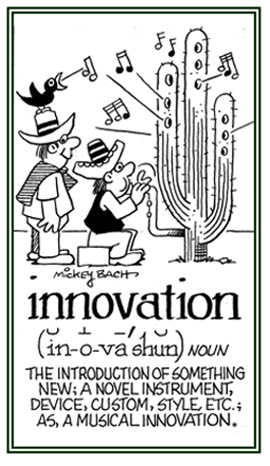
© ALL rights are reserved.
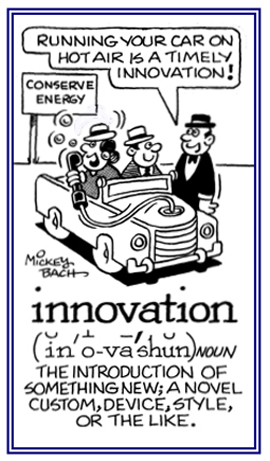
© ALL rights are reserved.
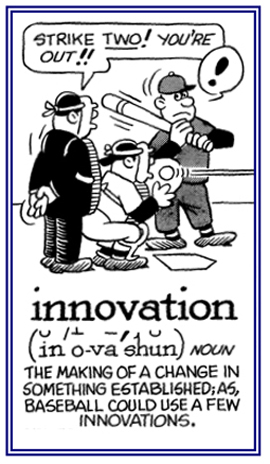
© ALL rights are reserved.
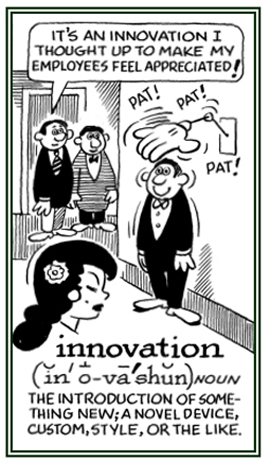
© ALL rights are reserved.
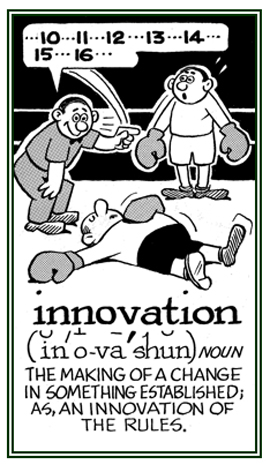
© ALL rights are reserved.
Go to this Word A Day Revisited Index
2. A new invention or a new way of doing anything: Before the innovation of computers, people used simple manual or electric typewriters to write their documents.





Go to this Word A Day Revisited Index
so you can see more of Mickey Bach's cartoons.
inoculation
1. Taking a vaccine as a precaution against contracting a disease.
2. Introduction of material (usually a vaccine) into the tissues.
3. A mode of entry of bacteria into the body.
4. The act or an instance of inoculating, especially the introduction of an antigenic substance or vaccine into the body to produce immunity to a specific disease.
5. Informal, a preemptive advertising tactic in which one party attempts to foresee and neutralize potentially damaging criticism from another party by being the first to confront troublesome issues.
6. Etymology: from Latin inoculare, "to engraft an eye, or a bud, from one tree into another one, to implant"; from in-, "in" + oculare, "to furnish with eyes", from oculus, "eye, bud".
2. Introduction of material (usually a vaccine) into the tissues.
3. A mode of entry of bacteria into the body.
4. The act or an instance of inoculating, especially the introduction of an antigenic substance or vaccine into the body to produce immunity to a specific disease.
5. Informal, a preemptive advertising tactic in which one party attempts to foresee and neutralize potentially damaging criticism from another party by being the first to confront troublesome issues.
6. Etymology: from Latin inoculare, "to engraft an eye, or a bud, from one tree into another one, to implant"; from in-, "in" + oculare, "to furnish with eyes", from oculus, "eye, bud".
insalivation
When chewing, the mixing of saliva with food.
insemination


